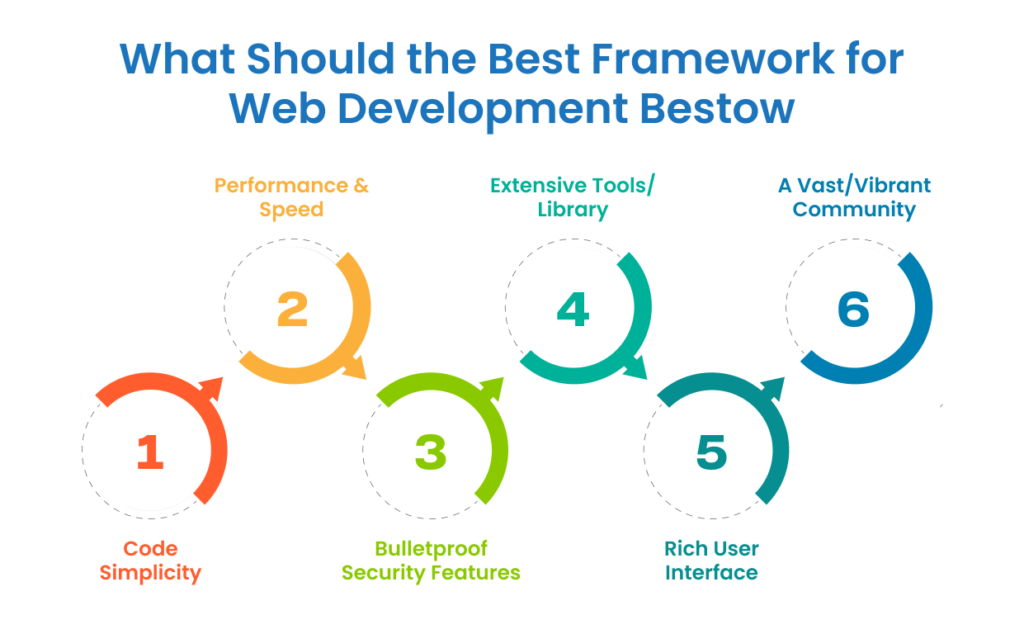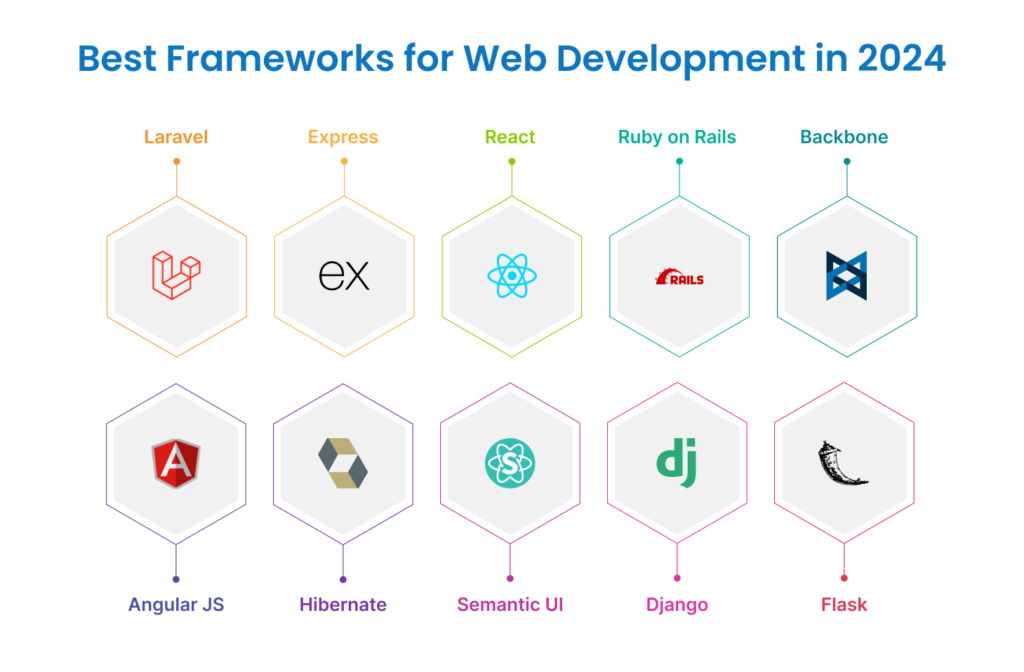
Exploring the Best Framework for Web Development: A 2024 Guide.
There are around 28 million web developers globally! Amongst them, Java Web
Development is the most popular career avenue with over 9 million Java developers. But what does web development, and more precisely, a best framework for web development mean?
In Layman’s terms, web development frameworks are an essential tool that provide a pre
built structure for building websites, web apps, web services, web APIs etc. This allows
developers to focus on the unique aspects of their project rather than worrying about
repetitive tasks such as handling HTTP requests, database management, and managing
user interfaces.
In this article, we’ll explore what an ideal web framework should encompass, and provide a
list of the 10 best frameworks for web development in 2024.
So, whether you are a seasoned developer or a business owner looking to hire Java
developers for your front-end or back-end project needs, this list will serve as a helpful
guide to ensure project success.
Let’s get started!

What Should the Best Framework for Web Development Bestow
Code simplicity:
Core reusability offers several time-saving advantages that accelerate the overall
development cycle whilst removing errors and redundancies. By leveraging ready-made
code for common tasks and processes, developers can exponentially reduce time-to
market and seamlessly scale up/down to meet ever-changing customer demands.
Performance and Speed:
A robust framework provides a structured environment to help developers optimize their
product for speed and efficiency. A systematic, consistent, and error-free approach to web
development essentially guarantees top-notch performance across a multitude of use
cases. Embracing speed when building web apps, websites, web APIs, etc. automatically
translates to customer satisfaction.
Bulletproof security features:
Users refrain from using websites/web apps riddled with security issues. Hence, the best
frameworks always ensure optimum cybersecurity, protecting your sensitive data from a
myriad of cyber-attacks like unauthorized access, XSS attacks, dependency injection, etc.
Security is particularly useful in Java for web development as users can utilize the vast
community to ensure adherence to the latest security protocols.
Extensive tools/libraries:
Most Java-based frameworks are equipped with extensive third-party tools and libraries for
seamless data management, stunning UX/UI, automated testing, etc., thus streamlining
the entire development process. Moreover, companies that Hire Java Developers use
frameworks like Spring and Hibernate to organize complex data using no or minimal
coding.
Rich user interface:
A robust UI isn’t just a nice-to-have feature, it’s a critical component that determines how
well the users will interact with your website, app, or service. A responsive UI helps
customers navigate through the app, providing an immersive experience. And when users
can find what they’re looking for with speed and simplicity, it incentivizes them to keep
coming for more.
A vast/vibrant community:
Most web frameworks thrive on a vibrant community of developers committed to 24×7
support and guidance. A strong community provides developers the right guidance through
visual tutorials, forums, upgrades, plugins/tools, etc., while allowing businesses to
achieve their project goals. Note that few communities can match the trust and reach of
Java Maintenance and Support.

Best Frameworks for Web Development in 2024
The best frameworks should provide the perfect blend of speed, ease of use, security,
performance, and rapid development. Keeping these factors in mind, here are the 10 best
frameworks in 2024 (for front-end and back-end development) that can fuel your digital
transformation journey.
Laravel
Launched: 2011
Used by: Laracasts, MyRank, World Walking, Invoice Ninja, Envoyer, etc.
Laravel is the most popular, open-source, MVC-based PHP framework used to simplify
core development tasks. With its ability to streamline real-time event broadcasting and
create a strong background and job processing system, Laravel is extensively used for
building enterprise-level web apps like online communities, eCommerce platforms, and
social networking apps. Also, Laravel use cases are not limited to just websites; it is a
powerful and accessible framework that provides developers with the necessary tools to
build powerful, secure, and graphic-rich web applications.
Express
Launched: 2010
Used by: Uber, Yelp, IBM, Groupon, Trello, etc.
Express.js (or simply Express) is a dynamic and flexible framework for Java web
development, popular for its simplicity and wide adoption across the Node.js ecosystem.
It’s minimalistic approach to web development allows extensive customizations, and
feature add-ons via third-party plugins. Enterprises that hire Java developers usually go
with Express.js to accelerate the entire development process without compromising
functionality or scalability.
React
Launched: 2013
Used by: Facebook, WhatsApp Web, Dropbox, GitHub, Airbnb, etc.
While not exactly a web building framework, React.js is an open-source JavaScript library
that makes front-end development for single-page applications (SPAs) easy using Virtual
DOM. By integrating React with Angular in the MVC template, you can enhance your
product’s functionality and aesthetics. Leveraging Java Maintenance and Support
capabilities, ReactJS facilitates data management throughout your app ecosystem,
without the hassle of reloading the entire app. Many companies seeking Java development
company choose React to build lightweight apps with native-like capabilities and a clean
syntax.
Ruby on Rails
Launched: 2004
Used by: Shopify, Basecamp, Twitch, Cookpad, Bloomberg, etc.
Compared to traditional Java frameworks, Ruby on Rails is popularized for its “convention
over configuration” philosophy and rapid development capabilities. With a myriad of
automation and collaboration tools, Rails has played a foundational role in many high
traffic websites’ early-stage tech stacks! Leveraging the MVC architecture, Rails is the
ultimate choice for quickly launching your dynamic, data-driven web application.
(Note: Since Rails lacks the community support for comprehensive app testing,
developers may have to rely on third-party tools)
Backbone
Launched: 2010
Used by: SoundCloud, LinkedIn Mobile Web, Hulu, DocumentCloud, Trello, etc.
Backbone.js is a framework for building front-end component of a website. It uses a
structured approach to app functionality using the MVC (Model View Controller)
architecture. This way, developers can create user interfaces that are responsive and
dynamic. One of the key benefits of Backbone.js is its flexibility. Developers can select the
parts they need and modify them as required. As a result, it is easy to integrate
Backbone.js into an existing codebase without any significant changes.
AngularJS (or simple Angular)
Launched: 2016
Used by: YouTube for PlayStation 3, Weather.com, UpWork, Freelancer, The Guardian,
etc.
Angular, developed by Google, is a JavaScript-based framework that empowers you to
create visually stunning, dynamic web applications. Since launch, Angular has become the
go-to solution for companies looking to hire Java developers and build a cutting-edge
product. Angular’s seamless adaptability to large-scale projects helps developers conduct
Java app testing and create exceptional user journeys without being burdened by technical
intricacies.
Hibernate
Launched: 2001
Used by: IBM, Dell, Oracle, Daily Hotel, etc.
Hibernate, a Java Web Development framework, is widely utilized in simplifying database
interaction. Instead of writing raw SQL queries, Hibernate allows developers to work with
pre-integrated Java objects for seamless development. Its features include a robust API,
lazy loading, Automatic Schema Generation, and data filtering, that helps users manage
complex data interactions with minimal coding. Note that while hibernate is a popular
framework used in backend infrastructure, it is usually a piece of the puzzle in a web app’s
overall tech stack. Still, its data handling tools make Hibernate useful in Java for web
development.
Semantic UI
Launched: 2014
Used by: NASA, WeTransfer, DuckDuckGo, Scribd, Walmart Canada, etc.
Semantic UI is a front-end web development framework that excels at creating highly
responsive and interactive user interfaces. It provides a wide range of pre-integrated UI
components (CTA, icons, buttons), which work seamlessly with popular programming
languages like JavaScript, HTML, and CSS. Semantic UI also seamlessly adapts to different
devices and screen sizes, making it an excellent choice for cross-device compatible apps.
Django
Launched: 2005
Used by: Instagram, Spotify, Mozilla, Eventbrite, The Washington Post, etc.
Django stands out from other Python frameworks for its exceptional flexibility and powerful
UI. With its ability to validate user profiles, streamline content, and provide real-time
updates, Django has become integral to powering many websites’ backend infrastructure.
For developers looking to create complex, graphic-intensive web applications with
effective data management, Django is the solution they’ve been looking for.
Flask
Launched: 2010
Used by: Netflix, LinkedIn, Twilio, Reddit, Pinterest, etc.
While Flask is a microframework written in Python, it may be an ideal choice for building
lightweight or single-page applications with added customization capabilities. With Flask,
developers are free to choose third-party extensions based on specific tasks (like user
authentication, connecting to a database, etc.). If you’re looking for an easily adaptable
and lightweight framework for quick deployment, then Flask’s minimalistic approach
makes it a perfect choice.
Conclusion: –
And there you have it, the best framework for web development (as of 2024) to choose for
your next project!
Now, with a wide range of frameworks available, it can be overwhelming to decide which
one is the best fit for your project.
Our team of skilled developers is here to help you choose the perfect web development
framework for your project. We understand that every project is unique, and that’s why we
take the time to assess your requirements and suggest the most appropriate framework for
your needs. From React to Angular, Vue.js to Laravel, we have expertise in all the popular
web development frameworks. We consider a range of factors such as the project size,
complexity, scalability, and the experience of your development team before making our
recommendation. So, why wait? Reach out to us with just one click, and let our team help
you build the web application of your dreams!
So, buckle up and get ready for an exciting journey into the world of web development
frameworks!

